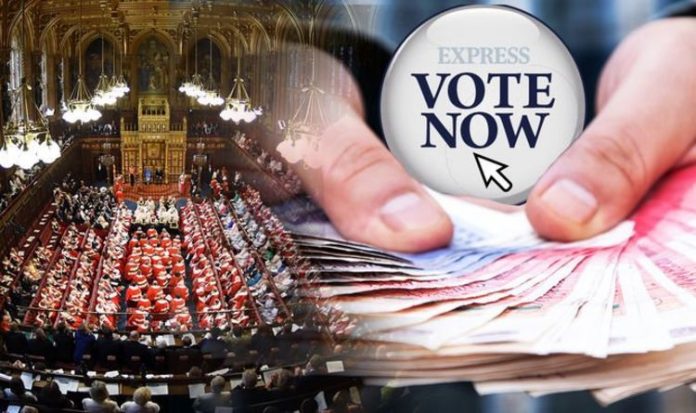The running of the House of Lords comes at a significant cost to the UK taxpayer, as the number of peers has now surpassed 800 members. Each peer costs the taxpayer £30,000, according to estimates by the Electoral Reform Society (ERS).
But expenditure doesn’t stop there, as running costs for the Upper Chamber rose from £99million to £117.4million in 2018/19 according to ERS figures.
The ERS estimates the 36 new peers recently appointed by Prime Minister Boris Johnson will increase the overall amount to the taxpayer to £1.1million a year.
For signing into the chamber, members also receive a payment of £323 a day tax-free.
As a result, Express.co.uk is asking you whether the House of Lords should be scrapped?
Commenting on the data, a spokesperson for ERS told this website: “Voters will not be pleased with yet more unelected peers making their way in to claim expenses.
“The current system is ripe for exploitation, with peers having to do little more than sign in to claim their tax-free allowance.
“The fact that voters cannot hold them to account at the ballot box is a recipe for wanton disregard for taxpayers.
JUST IN: House of Lords true cost REVEALED: What UK taxpayer could fork out
“At the moment, the loophole-ridden, scrutiny-free expenses set-up just allows distrust to sink deeper into our democracy.”
The group has launched a petition to scrap the House of Lords, following the news that dozens of former Tory MPs, party donors and Brexiteers have been made peers.
The petition has received backing from over 400,000 people and calls for an end to new appointments to the Lords.
It argues the Upper Chamber should be replaced with a “fairly-elected chamber the reflects the UK”.
The 36 new peers include Tory party donor Michael Spicer, former party chairman Sir Patrick McLoughlin and Mr Johnson’s own senior adviser, Eddie Lister.
The Prime Minister’s brother Jo Johnson is also due to become a member of the Lords.
No10 did acknowledge the size of the House of Lords still needs addressing but said new members were needed to ensure the Lords “continues to fulfil its role in scrutinising and revising legislation”.







